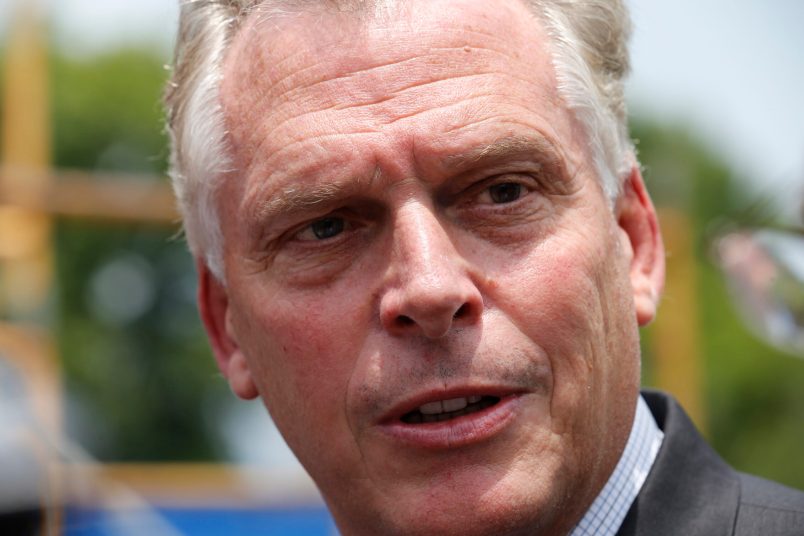After Virginia Republicans blocked Medicaid expansion under Obamacare in June, Democratic Gov. Terry McAuliffe was defiant. He pledged to return in the fall with an alternative plan that would unilaterally help cover low-income Virginians. “We’re moving forward,” he said.
But the plan McAuliffe announced Monday falls far short of pushing through the Medicaid expansion his state’s Republicans have fought so hard.
McAuliffe’s plan, formulated after extensive discussions between state and federal officials, will directly cover only about 25,000 Virginians — a fraction of the 400,000 low-income residents who would be covered by Medicaid expansion. So for now, it seems, the GOP has won in its showdown with the governor over this key provision of Obamacare.
McAuliffe spent the first 10 minutes of his address Monday morning repeating the case for Medicaid expansion, which was doomed after Republicans won control of the state Senate when a Senate Democrat resigned after allegedly being offered a posh spot on a state tobacco board. With Republicans controlling both chambers of the General Assembly, they quickly nixed any expansion talks, which had been ongoing in the previously split Senate, forcing McAuliffe to pursue the alternatives he announced Monday.
“This is what I want for Virginia. But the House of Delegates blocked any and all bipartisan efforts to expand coverage through Medicaid and refused to consider or even offer a single compromise,” he said.
He invoked conservatives states like Indiana and Wyoming that are exploring expansion. “While we are paying money in, we won’t reap any of the benefits,” he said.
But then McAuliffe got down to what he was actually proposing, an assortment of new regulations and executive orders. The most significant was a new Medicaid waiver that would extend coverage to 20,000 people with serious mental illness. Another 5,000 children would be covered by opening up the state employee insurance program to the children of low-income state workers.
Other announced plans included offering dental benefits to pregnant women enrolled in Medicaid and accepting more than $14 million in federal funding to market HealthCare.gov and sign up people for private coverage under Obamacare. McAuliffe set the goal of enrolling 160,000 people through the federal website with that new effort.
“Through those actions, the lives of 200,000 Virginians will get access and better quality health care,” he said.
But it was all a far cry from what seemed to be coming when McAuliffe said in June that his administration “has several options that we’re looking at, but we’re going to provide health coverage to our citizens.” At the time, nobody was sure what exactly the governor had the legal authority to do, and so Monday’s announcement was closely watched by those inside and outside of the state. In the end, it seems Virginia law significantly limited what McAuliffe was able to do unilaterally.
That likely helps explain why McAuliffe spent as much time trying to put the pressure back on Republicans to accept expansion as he did announcing his new plans. The governor reiterated his support for a privatized expansion, as has been done in Arkansas and Iowa, and alluded to a public-private partnership that he has discussed with the Obama administration that would rely “totally on private funding.” The state wouldn’t “have to risk one single payment of general fund dollars.”
“While the plan that I am announcing today will do a lot of good for a lot of people, it does not solve the larger problem of providing health insurance coverage to low-income Virginians,” he said. “The General Assembly has made it perfectly clear that they unequivocally are the ones that have the power to expand and close the coverage gap. What comes with that power also comes responsibility.”







Their mommies must be so proud.
Its stuff like this that make me wonder about polls that show these bastards ahead
At least you get the headline right. Most news organizations will characterize this as a failure by the Democratic governor, not as obstruction by the GOP controlled legislature, which is what it is. For the life of me, I do not understand why Dems throughout the South and Bible Belt are not running on the fact that their citizens are paying for other states to expend Medicaid, while getting none of the benefit because they won’t expand Medicaid in their owns states. I would hate to be dumping billions in tax revenue into the Federal treasury and getting nothing back, while blue states rake it in. Seems like that might actually resonate, given the selfishness that pervades Republican politics these days.
Sadly the GOP is willing to take the entire ship down just to satisfy their racist dogma that demands opposition to anything the President supports. Hopefully the good folks in Virginia will recognize this for what it is, and vote them out of office.
This is what happens when progressives attack Democrats and effectively convince people not to show up at the polls, do-nothing Republicans get elected.